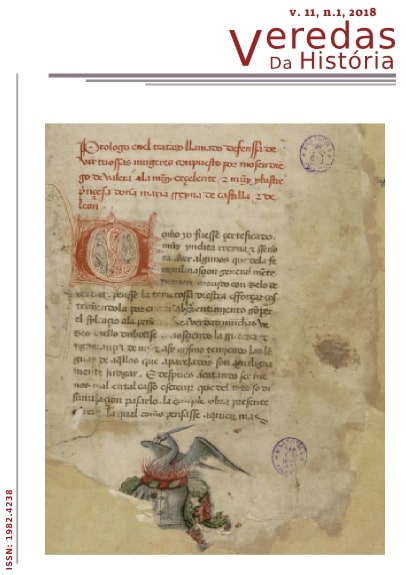Seguindo os passos de um mito: Lúcio Quinto Cincinato, George Washington e a perpetuação do ideal de virtude romana
DOI:
https://doi.org/10.9771/rvh.v11i1.47894Palavras-chave:
Cincinato, George Washington, VirtudeResumo
Expomos a seguir as linhas tênues entre George Washington e Lúcio Quinto Cincinato. Partindo do pressuposto que Washington seguiu conscientemente muitos dos passos de Cincinato, argumentamos que as diferenças entre ambos se faz no sentido em que Washington, personagem histórica, está sujeito à falibilidade característica de um ser humano real, enquanto Cincinato, personagem mítica, possui um histórico intocável de virtude devido à sua própria natureza mitológica e à falta de acesso de documentos que descrevam sua biografia. Assim, demonstramos como George Washington construiu um ideal de virtude baseado em Cincinato, e como tal empreitada edificou-o como uma das imagens republicanas sacralizadas nos Estados Unidos, a qual foi perpetuada pela historiografia contemporânea a Washington e que hoje é progressivamente desconstruída pela historiografia atual.
Downloads
Referências
A) Documentação primária
LIVY. The History of Rome, books 1-5. Translated by Valerie M. Warrior. Indianapolis/Cambridge: Hackett, 2006.
SHAKESPEARE. Coriolano. Tradução de Nélson Jahr Garcia. S.l: Ridendo Castigat Mores, 2000.
The Constitution of the United States of America, 1787.
B) Obras de referência
AURICCHIO, L. Two Versions of “General Washington’s Resignation”: Politics, Commerce, and Visual Culture in 1790s Philadelphia. Eighteenth-Century Studies, Buffalo, v. 44, n. 3, p. 383-400, spring 2011.
BROWN, W. B. The Cincinnatus Image in Presidential Politics. Agricultural History, Kennesaw, v. 31, n. 1, p. 23-29, January 1957.
BURSTEIN, S. M. The Classics and the American Republic. The History Teacher, Long Beach, v. 30, n. 1, p. 29-44, November 1996.
CALDWELL, C. Character of General Washington. S.l.: True American, 1801.
CHERNOW, R. A Dreary Kind of Place. In: ______. Washington: A Life. New York: Penguin, 2010. p. 323-336.
COLE, N. P. George Washington and Republican Government: The Political Though of George Washington. In: LENGEL, E. G. (ed.). A Companion to George Washington. Oxford: Wiley-Blackwell, 2012. p. 430-446.
FERRARO, W. M. George Washington’s Mind. In: LENGEL, E. G. (ed.). A Companion to George Washington. Oxford: Wiley-Blackwell, 2012. p. 542-557.
FITZ, C. An Age of American Revolutions. In: ______. Our Sister Republics. The United States in an Age of American Revolutions. New York/London: Liveright, 2016. p. 1-16.
HELSLEY, A. J. George Washington in Retirement. In: LENGEL, E. G. (ed.). A Companion to George Washington. Oxford: Wiley-Blackwell, 2012. p. 524-541.
HUGGINS, B. L. “The most unlimited Confidence in his Wisdom & Judgement”: Washington as Commander in Chief in the First Years of the French Alliance. In: LENGEL, E. G. (ed.). A Companion to George Washington. Oxford: Wiley-Blackwell, 2012. p. 245-265.
LENDER, M. E. The Politics of Battle: Washington, the Army, and the Monmouth Campaign. In: LENGEL, E. G. (ed.). A Companion to George Washington. Oxford: Wiley-Blackwell, 2012. p. 226-244.
MARTIN, T. R. Roman Values, The Family, and Religion. In: ______. Ancient Rome: from Romulus to Justinian. London/New Haven: Yale University, 2012. p. 20-40.
RICHARD, C. J. Classical Antiquity and Early Conceptions of the United States Senate. In: MECKLER, M. (ed.). Classical Antiquity and the Politics of America: from George Washington to George W. Bush. Texas: Baylor University, 2006. p. 29-40.
RIDER II, T. A. George Washington: America’s First Soldier. In: LENGEL, E. G. (ed.). A Companion to George Washington. Oxford: Wiley-Blackwell, 2012. p. 378-398.
SHALEV, E. Rome Reborn On Western Shores: Historical Imagination and the Creation of the American Republic. Charlottesville: University of Virginia, 2009.
STOERMER, T. “What Manner of Man I Am”: The Political Career of George Washington before the Revolution. In: LENGEL, E. G. (ed.). A Companion to George Washington. Oxford: Wiley-Blackwell, 2012. p. 121-136.
WILLS, G. Washington’s Citizen Virtue: Greenough and Houdon. Critical Inquiry, Chicago, v. 10, n. 3, p. 420-441, March 1984.
WILSON, C. The American Cincinnatus: the Unique Greatness and Republican Virtue of George Washington. 46p. Thesis (Graduation) – Ashland University, Ashbrook Center. Ashland. 2014.
WINTER, T. N. Cincinnatus and the Disbanding of Washington’s Army. The Classical Bulletin, Saint Louis, v. 51, n. 6, 81-86, April 1975.
WOOD, G. S. Interests and Disinterestedness in the Making of the Constitution. In: BRUNSMAN, D.; SILVERMAN, D. J. (eds.). The American Revolution Reader. New York: Routledge, 2013. p. 236-261.
______. The Greatness of George Washington. In: ______. Revolutionary Characters: what made the founders different. New York: Penguin, 2006. P. 31-63.
ZIOBRO, W. J. Classical Education in Colonial America. In: MECKLER, M. (ed.). Classical Antiquity and the Politics of America: from George Washington to George W. Bush. Texas: Baylor University, 2006. p. 13-28.






